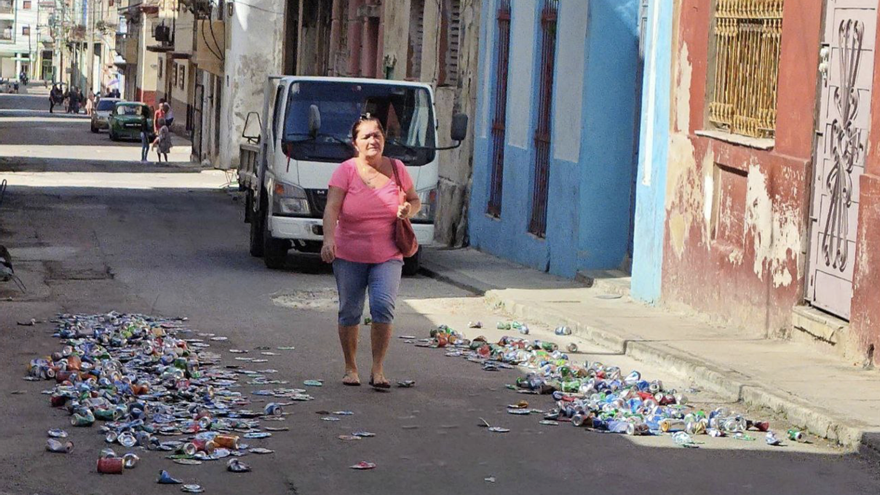
![]() 14ymedio, Juan Diego Rodríguez, Havana, 18 July 2024 — The man is about 50 years old and carries two sacks loaded with empty soda, malt and beer cans. He heads to Lealtad Street, in Centro Habana, where the neighbors already know him, and sit on the threshold of their houses to watch his routine. The job, long-standing on the island but almost extinct due to the pandemic – which scared away tourism, a great consumer of these drinks – consists of precisely placing the containers on the asphalt and waiting. When a car finally crushes them, they will be ready to sell as raw material.
14ymedio, Juan Diego Rodríguez, Havana, 18 July 2024 — The man is about 50 years old and carries two sacks loaded with empty soda, malt and beer cans. He heads to Lealtad Street, in Centro Habana, where the neighbors already know him, and sit on the threshold of their houses to watch his routine. The job, long-standing on the island but almost extinct due to the pandemic – which scared away tourism, a great consumer of these drinks – consists of precisely placing the containers on the asphalt and waiting. When a car finally crushes them, they will be ready to sell as raw material.
For at least four years – since Covid hit hard and the Yumas [foreigners] and the food disappeared – the collectors have hardly been seen in Havana. Their momentary disappearance, however, has not made them strangers to Cubans, whose imagination since childhood, along with other jobs on the Island — such as sharpening scissors or buying empty perfume bottles — still remembers “the old men who collect cans.”
They are almost always elderly, bent over by age and the weight of their bags. Most are men, but occasionally you see a woman.
The profession has a range of different collectors with regards to opportunities and resources. Some have tools to make their work easier, like the man who was carrying — on a tricycle and a wheelbarrow — sacks of cans of old Tu Kola, imported beers or the national Cristal and Bucanero beer this Wednesday on Belascoaín Street. Others, those in a worse situation, combine the activity with searching for food in the garbage, they go around in tattered clothes and with tanned faces.
Whether self-employed or not, collecting cardboard, aluminium or plastic has been one of those jobs that have always existed. It has achieved fame with buyers of “any little piece of gold,” and its worst moments with thieves of bronze statues and plaques. In any case, the metal always ends up melted down in a private workshop and turned into rings or water taps.

The job has even become mechanized: now it is the drivers who crush the cans with their vehicles, although there is always the risk of puncturing a tire. The collectors choose streets with little traffic because, although it takes longer to crush the cans, they are not visible to the police and inspectors. This also allows them to place and then remove the containers calmly, without being run over.
Others continue to use more “artisanal” methods, and press the containers with sticks, stones or with their feet.
The demand for flat cans is set by buyers, who ask for empty, clean and crushed containers. The most demanding are the private ones, who also pay more. For the collection of raw material for recycling, the State offered at the beginning of the year about 30 pesos per kilogram of aluminum. The same amount that the collectors must pay monthly for their license, not including social security. Private individuals will pay up to 100 pesos for the cans.

Although there are still those who “bite,” since the State company Materia Prima stopped paying due to lack of funds during the pandemic, few have returned to work with the State. Instead, they sell what they collect to scrap dealers who make tin cans, pots and aluminum cutlery.
For some, the work of the collectors is a curious example of the “productive chain” and the “circular economy” that the Government yearns for its own companies. What today is a malt in the hands of a Canadian, tomorrow will be a can crushed by a vehicle and the day after a jug to heat milk.
____________
COLLABORATE WITH OUR WORK: The 14ymedio team is committed to practicing serious journalism that reflects Cuba’s reality in all its depth. Thank you for joining us on this long journey. We invite you to continue supporting us by becoming a member of 14ymedio now. Together we can continue transforming journalism in Cuba.
